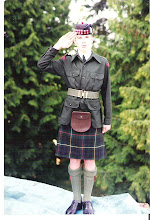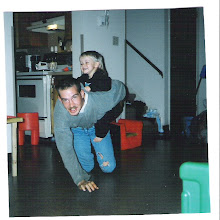Today is a difficult day for me, it's the the first anniversary of the day that I was frantically trying to get to England, willing the miles to pass faster while I pleaded with whomever you plead with in these situations, all while desperately hoping that everything was in fact just a mistake and Vikki would actually be ok. It's easier to occupy your mind with such fantasies than it is to analyze the shock you've just had, or to let the pain get too big. We're British you know, stiff upper lip and all, brave face in public, etc. I wonder how many of us are actually emotionally damaged because of that one particular cultural directive. I know I am, but that is a another post all in itself. For this post I want to talk about how grief is regarded in our Canadian society. Mostly because I am struggling with so much grief of varying levels of pain, and I'm not sure where to start untangling everything.
I'm somewhat embarrassed about this state that I found myself in. I KNOW I am not supposed to feel shame for having a mental health crisis. I know that we SAY that mental health is important. I'm just worried that isn't really the truth. What will they think of me at work? When I go back, will I still be considered capable? Will this affect future promotions or opportunities? Will they see ME?
I asked my therapist what he would call my "state." He said he would call it a Major PTSD Depressive episode with Adjustment Disorder due to grief" but then he said "You are not your grief. I've known you for a long time, and I see YOU."
I don't know how many people actually see me.
I can be honest with people, but I find that they don't actually want the truth. They want me to say "I'm fine," or "living the dream." My children know parts of my childhood were hard, but I wouldn't share the details with them. My husband knows some of the more intricate details, but I am loathe to burden him or add to his struggles with the demons inside of me. My best friend Dawn witnessed some of my childhood abuse, but she's been distant lately, and we are far apart. I know I can say anything to my therapist. I know these people are people who do see me. I try to craft whatever façade is needed for the other people I am interacting with. One of my first signs that I was going downhill should have been when I stopped doing this. I started saying things like "I'm not doing well," or "I feel sad." But these types of conversations make people feel uncomfortable and, in turn, their reactions increased my isolation. And I started noticing people would comment that I was always being so negative, rather than sit with me and ask me if they could help. Not everyone, mind you, I have some very supportive friends who love me despite of me being me. But this still leaves me trying to discern what amount of grief and grieving time is proper, and what types of grief are permitted. The answer should be all grief is valid, but we all know that's not the truth.
People respond differently to the types of loss they experience, each loss is unique. But the way we respond to them is based on an unwritten societal hierarchy that defines how much someone should be upset and grieve, and for how long. It's stupid. I don't like using that word, but come on, why do we make our own lives harder in the name of society? Many cultures honour death and grief much better than we do. In Vietnam each death is mourned for a year, and there are certain rituals and points along the way where you still connect with your loved ones and your memories. Here, it feels like once a funeral is done, you should be over it. Back to work, smile, be productive and don't be a downer. Is it any wonder we bury our emotions until they are to large to contain? And that when it bursts, we break apart?
I guess it gives my therapist a job to do. Look at me, supporting my local businesses!
So one of my losses that still affect me quite a bit is when my dog died. Yes, I said my dog. Most people do not recognize grief from pet loss, so it's a very isolating journey. I got Luna as a puppy in BC the day after your funeral. She changed my life. I don't have a PTSD dog, but she was always there when I needed her. She lived a long life, longer than what is normal for her breed. Luna blessed us for 15 years - her entire lifetime. My kids grew up with her. I am pretty sure she hung on so long because I was going through my Mom's drawn out death, and I needed her. I DID need her. That dog lived for so long she was blind and deaf by the end. We'd even scheduled an in home vet appointment so she could die with us in her home, but she rallied and we cancelled it. We did heap lots of attention and treats on her. But when her death came it was not a good death. It was very traumatizing for me. Something had happened in her brain, and she had seizures all the way to the emergency vet at 2am. It's not easy to hang on to a medium size dog having seizures, but I was not going to abandon her on this last final car ride, so I sat in the rear seat with her so she'd have room to move as needed. By the time we got to the vet, the pressure in her head was so much her eyes were bulging out of her head. I couldn't carry her into the vet because of the seizures, they had to bring a contraption to take her in on. We went straight to the back into a surgery room, but I KNEW this was the end. The vet dallied with his consult of my precious Luna, and my heart was breaking with each passing second. I told him to put her down, because I knew I'd already lost her and I couldn't bear to see her in anymore pain. He killed her right there, in my arms, on that operating table.
She took part of me with her, all those times that she comforted me when it was just her and I. Our adventures together. The tears she would lick away. It's the same parts of me that everyone takes with them upon death - the memories of who I was in life with just that person, and the stories they had of me. It's hard to lose that, I am sure there is a grief term for that loss, but you are suddenly forever different.
So my dog died. She was 15 years old, an age where no one has any sympathy for you, or they have a limited sympathy that is not really permitted to be longer than just that conversation.
Because she was "just a dog" and I could "get another one."
But she wasn't just a dog. She was MY dog, and she came into my life at exactly the time I needed her to. She was born a street dog in Thailand, a descendant of the great Thai Ridgeback, and was in a live animal food market. To be food. A Canadian tourist saw them there and bought the whole litter. An animal rights organization in Thailand helped her get all the dogs to BC, where she took them to the SPCA for adoption. It was, by happenstance, the SPCA my best friend worked at, and she phoned me and told me she'd found the dog I needed. And she was right.
Luna died 5 years ago now. I didn't get a new dog. I didn't want any dog but Luna. Maybe the term is don't, because whenever I think of bringing a dog home my heart skips a beat and happily says "YES, lets bring Luna home!!!!"
I still grieve the loss of my dog. But that's not actually a "permitted grief." I can't say to someone I am sad because my dog died ... 5 years ago. I have registered in a grief therapy program that starts in January, and on the website it says, specifically, pet loss is not a loss that can qualify you for the program.
BUT IT'S STILL GRIEF. Honestly my grief journey with Luna's passing has been as real to me as any other loss I've had. So on the hierarchy of permitted grief, pets are at the bottom, only above the loss of a job, or relationship. So that's why I started Part One of Permitted Grief with the story of Luna.









